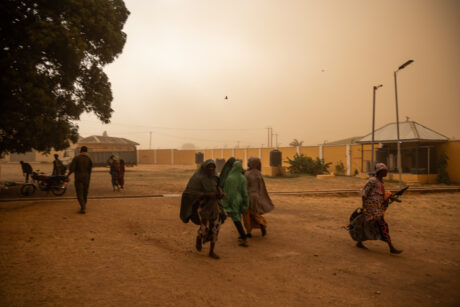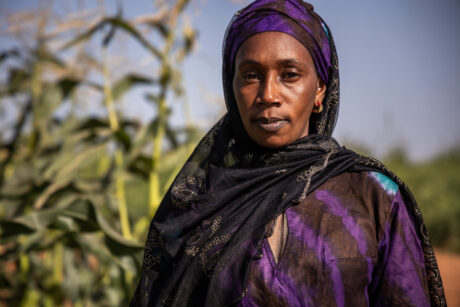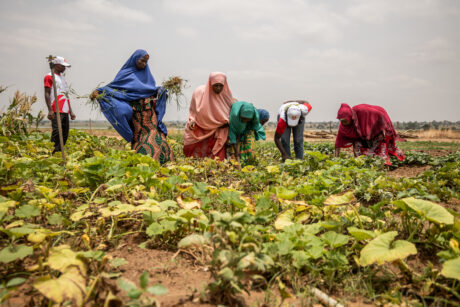Mujeres empresarias de toda África occidental hicieron presentaciones ante posibles inversores durante una serie de eventos en línea que demostraron el valor de las asociaciones público-privadas para superar las barreras al desarrollo económico..
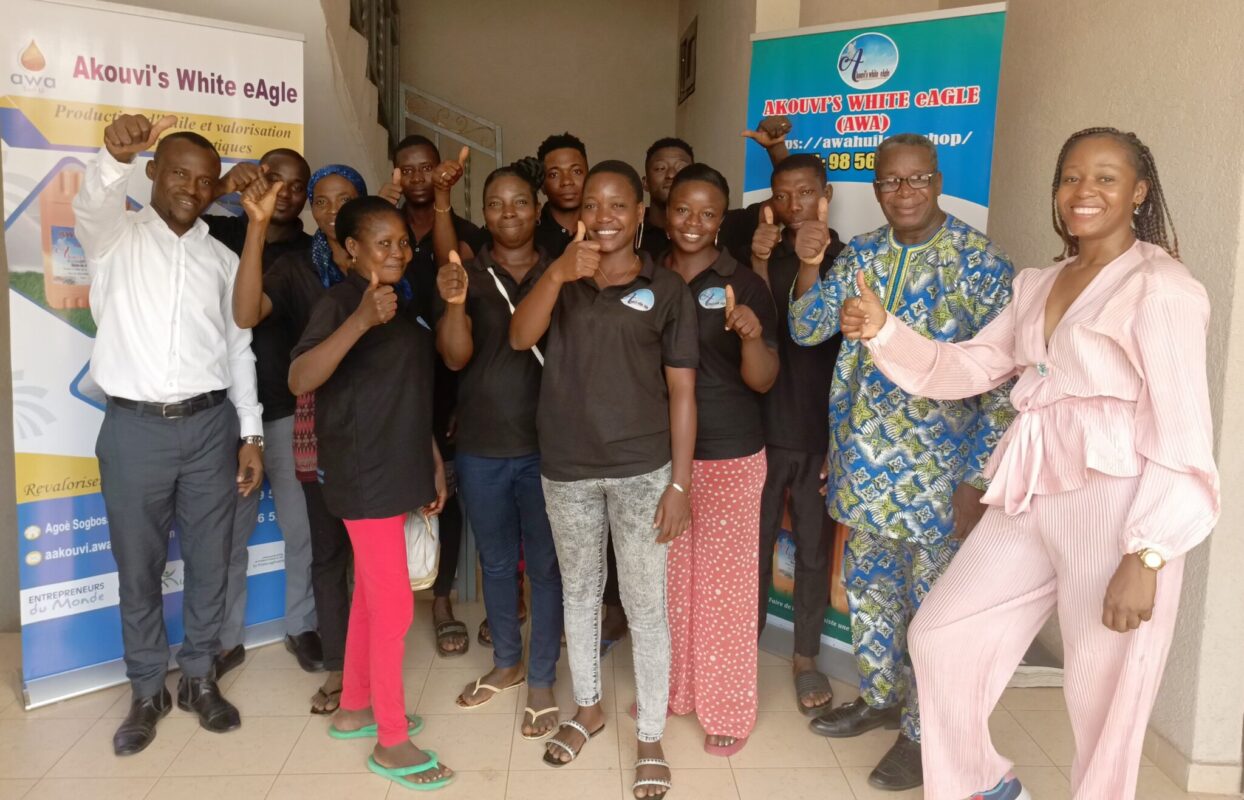
Akouvi Agbon, bien, se une a su personal para celebrar el crecimiento de su empresa, El águila blanca de Akouvi (AWA), que procesa palmiste a partir de 150 mujeres productoras en Togo. Agbon se presentó a inversores del sector privado a través de West Africa Trade, financiado por USAID. & Centro de inversión. (Foto cortesía de AWA)
Propietarios de negocios de Burkina Faso, Costa de Marfil, Ghana, Malí, Nigeria, Senegal y Togo se reunieron con inversores del sector privado durante los eventos del “Demo Day” en marzo 22 y 28, 2024, apoyado por USAIDComercio de África Occidental & Centro de inversión. El 21 Las empresas presentadoras habían sido seleccionadas como las graduadas más prometedoras de un programa de aceleración de negocios dirigido por la firma de inversión ShEquity y la organización sin fines de lucro MBC Africa con una subvención del Trade Hub.
“Muchos inversores dicen que quieren invertir en empresas dirigidas y propiedad de mujeres, pero no pueden encontrar una buena cartera de proyectos.," dijo Pauline Koelbl, Director General de ShEquity. "Entonces, Estamos aquí para abordar eso: proporcionamos el canal deseado”.
Mientras describe su progreso hasta la fecha y cuánto financiamiento necesitan para pasar al siguiente nivel., Los empresarios describieron cómo habían integrado las preocupaciones sociales y medioambientales en sus modelos de negocio.
Awa Dembélé regresó a Mali después de realizar una maestría en ciencias ambientales en Francia. Quería ver si podía ayudar a proporcionar una solución a varios problemas de la agricultura (una dependencia excesiva de fertilizantes químicos y una abundancia de desechos orgánicos) y al mismo tiempo crear empleos.. su empresa, damaverde, hace precisamente esto convirtiendo los desechos orgánicos en fertilizante orgánico.
Dembélé dijo a los inversores que ha encontrado un mercado entusiasta de clientes pero que necesita nuevo capital para expandirse.. Por ejemplo, está lista para vender en Senegal pero primero debe pagar las certificaciones. “Podemos ir allí si tenemos las inversiones necesarias.,”, dijo Dembélé.
Dembélé ve su producto como parte del concepto de economía circular, reutilizar en lugar de desechar.
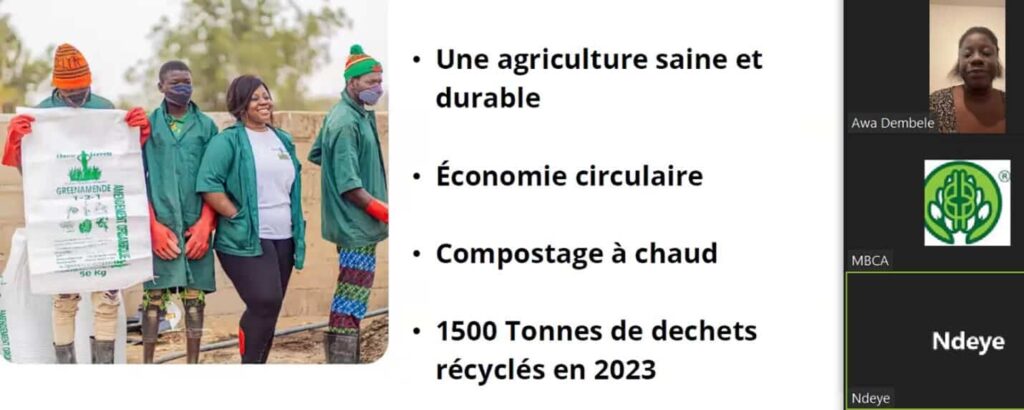
En Costa de Marfil, Padianhoua Salimata aprendió desde muy joven el oficio de cultivar piñas y mangos de su padre.. Ver cómo se perdieron ingresos potenciales debido al deterioro y a las temporadas cortas, ella fundó Layaki, que transforma el producto en frutos secos y mantequilla de mango, aumentando así los ingresos de los productores.
Salimata ha encontrado una fuerte demanda en el Reino Unido. Para vender en otros países., Les dijo a los inversionistas que necesita apoyo para expandir su fábrica y obtener certificaciones.
“El desarrollo de este proyecto me permitirá alcanzar una de las metas más preciadas de mi vida:, Crear una fundación para la prevención de la anemia falciforme para que ninguna mujer se vea obligada a renunciar a cuidar de sus hijos que viven con esta enfermedad.,Se añade Salima.
En Togo, Akouvi Agbon ayudó a organizar una cooperativa de mujeres productoras para satisfacer la demanda de aceite de palma de su empresa, AWA.
“Esto también crea empleos para estas mujeres que viven en zonas rurales y no tienen ingresos sostenibles.,“Agbon dijo. "Hasta la fecha, AWA ha permitido que más de 150 que las mujeres tengan una actividad generadora de ingresos a intervalos regulares”.
Observar cuántos envases de plástico se desecharon, Agbon añadió una nueva actividad empresarial: el reciclaje. “El plástico reciclado se utiliza luego en envases para la producción de aceite de palmiste.,Dijo Agbón.
Cada una de las empresarias compartió desafíos financieros, que, según dijeron, se ven agravados por percepciones estrechas de su papel como mujeres en los negocios.
La Agencia Minera Africana de Fatoumata Traore brinda servicios de capacitación y gestión al creciente sector minero de Mali. Pero algunos clientes se sorprenden al descubrir que la empresa está dirigida por mujeres.. “Las mujeres están realmente marginadas en estos sectores,” dijo Traoré. “Los hombres dicen que no es un trabajo para mujeres, que pertenecen al hogar”.
Los dueños de negocios señalaron que apoyar a las empresas procesadoras de propiedad africana mantiene más empleos e ingresos en África que el antiguo modelo de exportar materias primas e importar productos terminados.
Sylvie Sagbo-Gommard de Lysa & Co. señala que los productos de frutos secos de la empresa senegalesa son un producto saludable, alternativa hecha localmente a las delicias azucaradas importadas. Aramatou Coulibaly presentó un argumento similar en favor del procesador de cereales Rama Cereal de Costa de Marfil y señaló que 80 por ciento de los empleados de la empresa son mujeres.
Otras empresas expuestas fueron las procesadoras de alimentos y cosméticos African Foods Nutrition de Burkina Faso., Pneuma Food Scientifics y Savana Essence de Ghana, y lista de belleza, Momentos de fusión, El lugar de las nueces, Alimentos Pleroma, y Roki Foods de Nigeria; empresas financieras digitales Amira Global Technologies de Costa de Marfil y Alajo y Rouza de Nigeria; proveedor de logística VDL Cumplimiento de Ghana; empresa de reciclaje Chanja Datti de Nigeria; proveedor de contenidos educativos Ker Imagination Education Services de Senegal; y AskCare de Senegal, que vende equipos y suministros médicos a clínicas rurales.
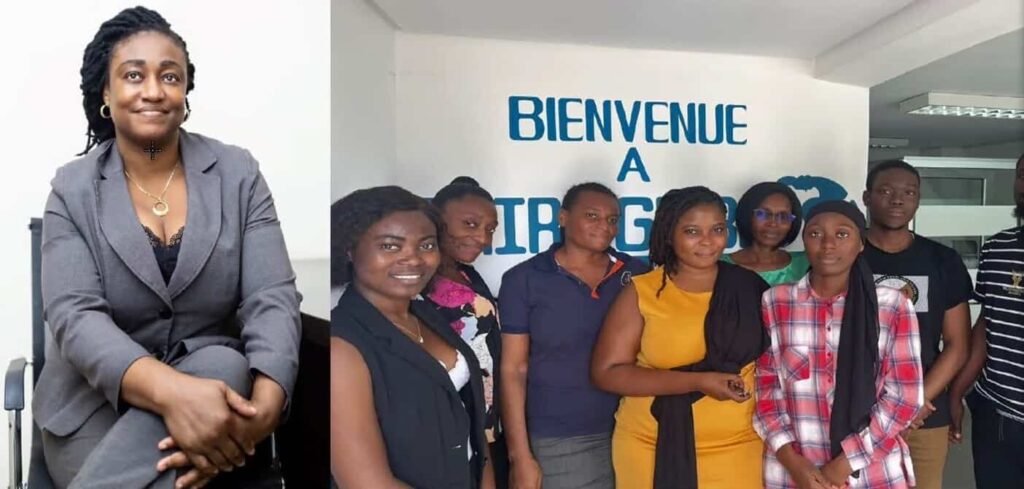
A través de su subvención de coinversión del Trade Hub, ShEquity ha proporcionado soporte técnico, tutoría y desarrollo de habilidades para 120 empresas a través de su aceleradora de negocios SHEBA, preparándolos para la inversión. Mientras que los eventos del Demo Day aumentan la visibilidad de las empresas y las posibilidades de recibir nuevas inversiones., también fortalecen las habilidades de los emprendedores para buscar apoyo en el futuro.
El comercio de USAID con África Occidental & Centro de inversión, implementado por Creative Associates International, Proporciona subvenciones de coinversión para ayudar a las empresas prometedoras a aprovechar financiación adicional del sector privado.. Desde su lanzamiento en 2019, el Trade Hub ha premiado $83 millones en subvenciones de coinversión para 92 empresas del sector privado en África occidental, habilitando $408 millones en gasto del sector privado que impulsó nuevos ingresos y creación de empleo.
